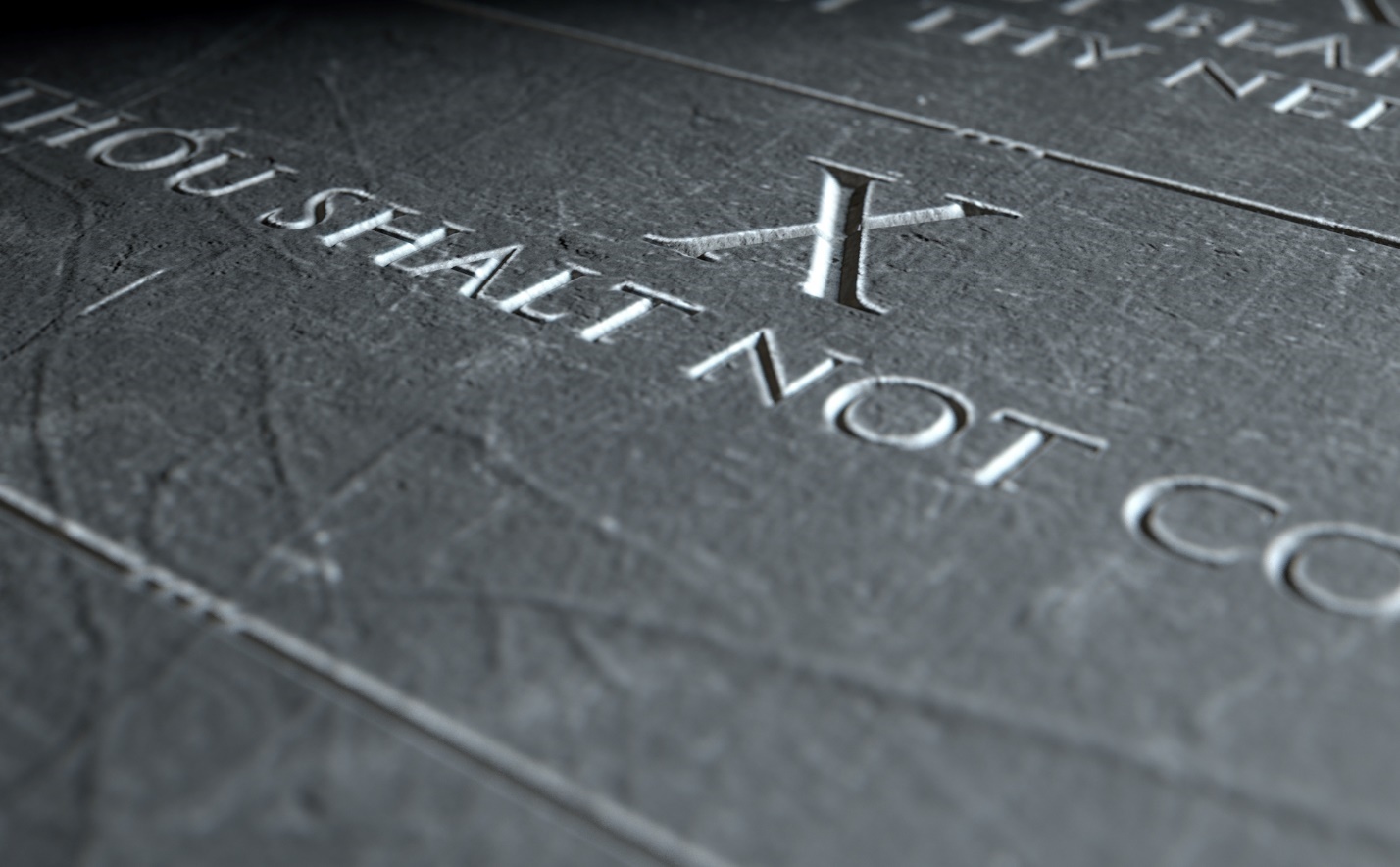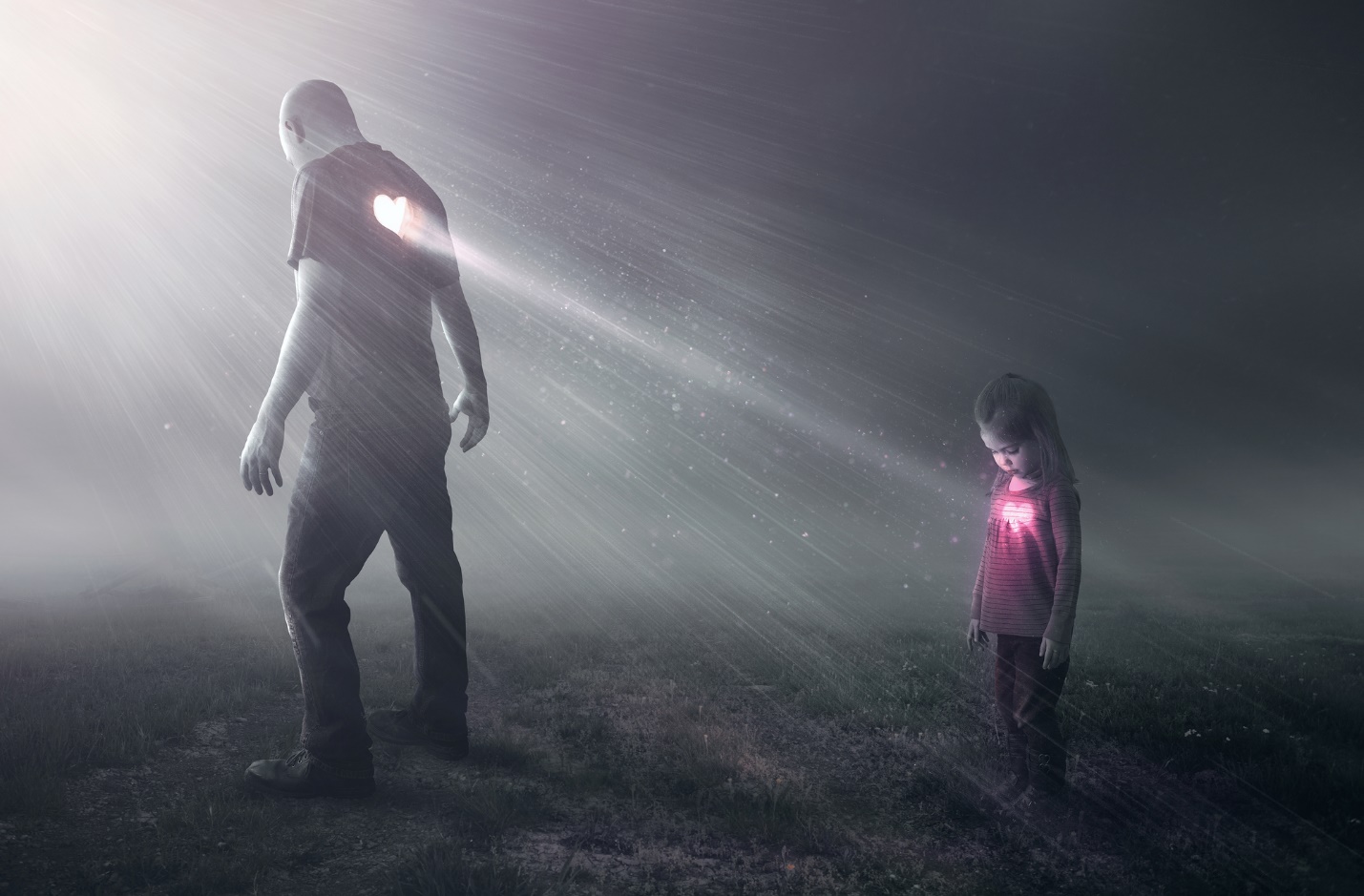BP93

My name is Derek, and have I suffered with anxiety for years. My lovely anxiety cocktail includes OCPD–you know, Obsessive Compulsive Personality Disorder. I am preoccupied with rules, order, and perfectionism. So, not too surprisingly, I much prefer the objectivity and predictability of my engineering work to the subjectivity and unpredictability of relationships.
I have been enslaved to religious scrupulosity since I was a teenager. In other words, I obsessively and perfectly follow all the rules of the Christian faith (and the speed limit and the masking rules and the government in general and the rules of board games to the point that my friends no longer want to play with me).
Yes, I am driven by an intense need to be moral. I must be extremely careful to know and obey all the statutes of the holy God because He wants me to be good, to obey, to avoid sin at all costs. I hate sinning, not because it separates me from Jesus but because I am then bad and not good. Yes, I’m a black and white kind of guy. I love being that way, and I hate it.
My wife is sick and tired of me. She tells me I want others to do things exactly the way I want them to be done—even the way she loads the dishwasher and cleans the counter and dresses our daughter. She says I am inflexible and stubborn, and that I am tight with money. She frequently nags me about being controlling and disengaged. I can tell that she is becoming increasingly angry with my emotional distance and isolation.
I fear that she will leave me. Soon.
I have believed for a long time that the way I see life and do life is the right way. In fact, it’s God’s way. After all, I’m an intelligent guy, I’ve given my life to Jesus, and I know the Bible better than most people—certainly more than my wife. So why would I have to change? My wife and the world needs to change, not me.
Besides, I can guarantee you that I will always work hard to do everything the right way. Otherwise, I will judge myself as lazy and . . . I will feel extreme anxiety. Doing things the right way undoes my anxiety and gives me peace.
I would never have looked inside to see what was wrong with me except for one thing—my ever-present anxiety. Oh, yes, and also the fact that sooner or later, all my friends leave me. Maybe I’m also motivated by my fear that I don’t know how to get close to my three-year-old daughter. That scares me. I don’t want him to grow up feeling like I did with my parents, namely, that they were physically so near but emotionally so far away.

Primarily, it was my anxiety and the misery of my OCPD that drove me to counseling. My therapist, who is also a believer, refers to therapy as sanctification. I was all over that idea right away. After all, I’m a guy who gravitates to being good, to becoming perfect, right? But then he told me that sanctification was less about being perfect and more about growing in my personal relationship with Jesus. My heart sunk. He said holiness matters, for sure, but it all begins with relational intimacy.
What follows is a summary of what I have learned over the last year while on my journey.
Being a rules guy, I love the Law of God. I am drawn to black and white solutions. You know, either-or thinking instead of both-and. I hate gray things, anything that’s vague. Just give me the facts. Things like Calvinism and arcing Bible passages appeal to my need to define things. I hate antinomies.
Grace is much more difficult for me to comprehend than the Law. So is something as subjective as love. Give me the right answer, my brain cries out. Why do you think I became an engineer and not an artist? I am most comfortable with the objective world: math, chemistry, and chess.
Sometimes, I think I would have fit well into the time of Moses. After all, he was God’s consummate law giver who received the Ten Commandments from Yahweh and taught the Israelites all the rules about how to be holy. Abraham is more difficult for me to embrace since he was justified by something subjective, namely, faith, not by keeping the Law which is much more objective.
Faith is so difficult for my mind to comprehend. It is one of those vague things I mentioned earlier. Maybe I’m better at doing than receiving, being good than being loved. I certainly am more comfortable with life being about right or wrong, good or bad, sin or holiness, hitting or missing the target. Yes, give me a target to aim at and I will strive to hit the bull’s eye with all my might.
When I became a Christian at sixteen, I remember one of my first thoughts: here is something I can be good at. Yes, I must be good to please God.
Since I want to control things, the law is a good fit for me. Grace, faith, and love are very subjective and out of my control. I prefer the objective, as I said. Tell me the rules and I will obey them. I will do my best to be perfect, to do things as they SHOULD be done! I have believed in God, so I know I have some type of faith. It’s just that I naturally gravitate toward being good, toward morality.
Do I strive to be good because I’m anxious or am I anxious because I must work so hard to be good?
Can a person ever be too moral? Too good? Too obsessed with doing the right thing? Previously, I would have said, Never! Heaven forbid!

Lately, I am beginning to think otherwise. I have been struggling with the question, Should I be good, or should I be loving? I believe the obvious answer is both, right? I want to be both good and loving. It’s just that I am wired to focus on morality. The doing. The obeying. Being in control of my behaviors. Obsessively so.
Will Jesus even love me if I slip up and sin? It’s too dangerous to focus more on love and less on being good and embracing right doctrine because then I might slip into heresy or apostasy.
Is it any surprise that I obsess about sin? If I was the pastor of my church, every sermon would be about how to avoid sin and how to obey. Focus on the behaviors. Right and wrong. Didn’t Jesus die so we would be good and perfect? Identify and root out sin would be the battle cry that would dominate my preaching. Be good. Don’t be bad. Don’t disobey. There would be little time for love and relationship.
Is there a difference between being good and being righteous? In Moses, I can be good by observing the Law. In Abraham, I can be righteous by faith (trusting Jesus). In my mind, I agree that I need to integrate Moses and Abraham into my faith since they both were called by God to speak His truth. In practice, I naturally lean toward Moses and the Law. Remember, I am a scrupulous man—detailed, thorough, proper, a man of integrity. I always try to do the right thing. To a fault. Is that a sin?
One more thing to obsess about.
So, did the Law of God choose me or did my scrupulosity naturally draw me to the Law?
Recently, I have learned something unsettling about myself. This particular truth about me previously had been a blind spot. I was totally unaware of it. What is this truth?
My rigid morality is a defense. It protects me from something like a perfect mathematical formula protects me from making a mistake. My observing of the Law appears to be less driven by a love for God and more by a need to be good, perfect, in control. In fact, I am increasingly aware that my obsession with moral striving interferes with my love for God and others. Bottom line: I don’t need God if I can be good enough on my own.
Trying to be good might not be what Jesus calls me to do? That can’t be right, can it?

I see two things that motivate this defense. Focusing on morality and being good means that: 1) I can make myself acceptable and lovable through performance and achievement 2) instead of relying on someone else’s love for me.
The two things, then, are first, developing a False Self (a new identity) because somewhere inside my brain I don’t believe my True Self is lovable or that I can ever be good enough to be acceptable to God and others. The mask of my False Self can also serve as a wall to protect me against future abandonment.
And secondly, if my faith is grounded in being good, then I don’t have to rely on somebody else loving me. I make myself good by rigid adherence to morality. Two birds killed with one stone. I’m good by my own efforts and I don’t have to depend on someone else to love me.
Obeying the Law is more independent and safer than depending on faith and grace. Oh, I certainly speak the words, faith and grace. I say that I have faith and that grace has made this blind man see, but I don’t swim in them. I’m sprinkled with them, you might say, not immersed. My immersion is in my earned integrity. Then I never need to rely on someone else. That’s what makes morality safe. I get to control it instead of being at the mercy of something outside of me.
I now see that I never felt loved by my parents. My father got sick when I was young and became an invalid. He didn’t have enough energy to give attention and love to all three of his children, so he gave it to the younger two. Maybe he thought that I, as the oldest, didn’t need him. Apparently, there was not enough of him to go around, so I was left out of my father’s love.
At ten years old, when my father stopped loving me, I made a vow deep inside my heart that no one else knew about. I vowed to never need him or anybody else because it hurts too much when they do not love you. It’s better not to need because then you will never be disappointed.
My father died five years after my vow. We were “even.” He didn’t love me, and I didn’t need him. I did not shed a single tear at his funeral.
When my father got sick, my mother turned to me, the oldest, to be her support in life since my father was absent. Maybe like me, she did not receive my father’s love, either. So, the natural thing for her was to look to her oldest child to take care of her.

Unfortunately, I came to despise my mother for her emotional dependence as well as her abandonment of me if I didn’t give her what she wanted. She would give me the silent treatment if I wounded her. She became as cold as ice toward me whenever I did not comply with her demands but became elated if I did what she needed me to do as her ‘little man’ (aka, her surrogate husband). I believe that I flirted with bipolar illness for several years due to her mercurial rejection and ‘love’.
To this day, I believe that my mother did not truly love me. She loved me for what I did for her. My father’s illness exposed his limited supply of love as well as my mother’s deep, immature dependency. What was it my middle school basketball coach used to say? Sports doesn’t always build character, it reveals it. Maybe the same is true for the difficulties of life: they reveal the maturity or immaturity of a person’s character.
Hopefully, suffering more frequently builds character because children always need their parents to be emotionally stronger than them.
I swore that I would never be like my mother. I half succeeded. I chose to be self-sufficient instead of needy and consuming, relying only on myself and not on others. I refused to make other people responsible for my childish neediness as my mother had done to me. Tragically, I think my goal in life was not so much to be me as it was to not be my mother. That’s messed up.
I also half failed in trying not to be my mother. My emotional withdrawal that naturally accompanied my self-reliance led me to detach from others. I basically ended up abandoning them (as my mother had done to me) by never attaching in the first place. So much for a healthy vow. How did that work for you, Derek?
Maybe I now judge my mother less. We all find our own ways to cope with pain.
The Law is a good refuge for fallen, broken, self-sufficient people who must avoid relying on others. Faith requires trusting someone else. Grace means admitting that I can’t be good enough in my own efforts to be acceptable to a holy God. I need Jesus.
Yes, both faith and grace are highly relational while moral integrity through strict observance of the Law requires no ability or vulnerability to trust and to love. Observing the Law only requires a drive to be perfect, a high level of scrupulosity. Perfectionism and scrupulosity are not very relational. In fact, I almost lost every relationship I had as I attempted to be good enough through following rigid rules.
Sometimes I shudder to think what I would have communicated to my congregation had I been a pastor.

The Law, morality, perfectionism, hitting the bull’s eye of performance—these are the monkey bars to which I have been clinging all my life. I believe in Jesus, but I cannot let go of my efforts. I must maintain my grip on being good enough and safe enough–in control. Yes, my life has been so much about me controlling things instead of trusting someone else to be in control. I have been a god unto myself.
I am the rich young ruler who came to Jesus. He kept all the commandments but could not surrender his heart to God. He could not let go of his love for money. Unlike the rich young ruler, I could care less about money. Oops, maybe I take that back. My wife says I control money and am even miserly. There’s that coping skill of control, again.
Still, I believe that the biggest things I cannot let go of are my fear of not being good enough and my inability to trust that someone will really, truly, genuinely love me. So, I must keep gripping the monkey bars of morality so that I will be good enough to be accepted (but maybe still never good enough to be loved).
Does my whole problem come down to my fear of trusting someone else? Is it all about self-sufficiency? Is it a coping skill I learned in childhood that is inextricably bound to my vow to not be needy? Is it my fear that if I make a mistake, I will be rejected, even abandoned?
The worst of it all, I am beginning to see, is that trying to be perfect in order to be loved takes me even further from love: the love of God, the love of other people, and even my ability to love them. Being obsessed with obedience to the Law is not relational. I am always focused on trying to determine and then do the right thing. I rehearse my mistakes. I even dwell on the mistakes and inadequacies of others as a way to distract from my sin.
Wretched man that I am! What am I to do? I can’t even feel my emotions because emotions remind me of my needy mother. And now that I have dammed up my emotions for twenty years, they are stronger than they should be, fermented within me to the point of explosion. Therefore, I must work even harder to suppress them and be in control.
Emotions are too dangerous to be accessed. Vulnerability is too painful. I must, therefore, surround my heart with a hedge of legalism.
Could OCPD be about avoiding being bad by trying to be good? I think so. My anxiety about being bad drives me to be perfect. But why keep living this way? Why not just walk away from God and morality and holiness and just let the chips fall where they may? Sometimes I think I have just enough ‘religion’ to be miserable. I can see why people deconstruct their faith.
Who will deliver me from this lonely, isolated, impossible, non-relational journey that daily distances me farther from God, others, and my own God-created self?

It is difficult to let go of my world view because there are rewards for being self-sufficient and striving for acceptability through obeying the commandments. I feel in control when I perform and achieve and do good things. I don’t have to depend on unpredictable others to make me feel good. I am not at the mercy of their bipolar moods.
Of course, the tradeoff is that I have no defense attorney when I sin or do something bad. As I’ve said, I do believe in Jesus, but I do not run to His throne with my sin. I’m left to defend myself when I transgress or miss the mark—or more accurately, condemn myself. The onslaught of shame is a tsunami and I have no defense against it. I drink it to the dregs and self-flagellate for a few days until I have paid the price for my badness. Then I begin the cycle of being good again–the control cycle that lasts for days or weeks before I encounter an inevitable release period again.
I am increasingly aware that my need to control is a defense, a self-protection against abandonment and obnoxious neediness. It is a coping skill that leads me to lean on myself alone instead of trusting someone else. If I do not rely on others, I will never be disappointed, or hurt, or abandoned. I will never feel unloved again.
But neither will I ever feel loved since I am shielding my True Self from the eyes of others. As long as I self-protect so thoroughly, I will be detached from others–totally alone.
And being alone is beginning to leak out in so many ways since God did not create me to be alone. My anxiety is just one example of the leakage.
Am I even a Christian? Some days my obsessive thoughts tell me I am not. But on my better days, I believe I am. I have believed with my heart and confessed with my lips that Jesus is Lord and that God raised Him from the dead. I simply have not fully surrendered to Jesus. I am still white knuckling the monkey bars, trusting myself to make it across.
Who will catch me if I let go? Does God really see me? Why would He want me? My own parents didn’t love me, so why would He? Do I dare risk trusting Him? Doesn’t He love me because He must? There is nothing in me that He would love me, right? What happens if I fail?
It is increasingly clear to me that my ability to trust God has been undermined by the coping skills I developed to survive my childhood. When I was a boy, I needed these defenses to protect my heart. Unfortunately, the very wall that once protected me from marauders now keeps me locked alone in the castle.
But there is good news. As I have increasingly allowed my counselor to see my heart (True Self) instead of my performance (False Self), I have felt the ice of my anxiety melt into an emotion, namely, anger. Transparency of heart apparently leads to further intimacy—“into me see.”

My therapist tells me that anger is usually the first emotion to emerge when a person moves from the False Self to the True Self, when the wall of self-protection begins to come down. So, while anger is not an easy emotion for me, its appearance is like the dove that appeared to Noah with a freshly plucked olive leaf in its mouth: it means that there’s dry land ahead. Soon, I’ll emerge from my confining ark of Law and self-sufficiency and move toward trusting others.
I am learning at the heart level what I have always known in my head but resisted, namely, that God doesn’t want me to be good; He wants me to be righteous. The Law can never make me good because he who lives by the law must keep it perfectly.
Was it not Paul who said, For all who rely on works of the law are under a curse; for it is written, “Cursed be everyone who does not abide by all things written in the Book of the Law, and do them.” Now it is evident that no one is justified before God by the law, for “The righteous shall live by faith” ~ Galatians 3:10-11.
Jesus brings a whole new paradigm that totally undermines the walls of my old paradigm. He doesn’t ask me to be good. He invites me to be righteous through a relationship with Him. The gospel is not about me earning His love by being good enough. It’s about Him loving me without condition and giving me His righteousness when I confess my sin and my need for Him. It’s about Him being good enough, Him loving me enough, Him being grace-ful enough.
I want to say, do, but He says, done.
Grace and unconditional love–both have nothing to do with my performance. In Jesus, God made me holy apart from my obsessive Law-observing. It is never about my lonely, self-sufficient efforts to earn His acceptance but about His love that I can experience when I enter into a relationship with His Son.
Today, I am working to embrace the truth that I am loved unconditionally. How difficult it is to surrender old paradigms and familiar coping skills. The reality is that God’s riches at Christ’s expense (G.R.A.C.E.) has opened a door in my wall of self-protection that, ironically, is more dangerous to me than anything that ever caused me pain. My fallen self and Satan can be so devious, telling me that safety lies in being alone and in control of my life.
Walls so quickly become prisons.
My vow to never need anyone, my anger toward my father for leaving me, my choice to control my future instead of to trust others, my rejection of my unlovable True Self coupled with the creation of a mechanism to make myself good through the Law–these all separated me from the Presence of God and from the love of others.
I am now working to dismantle my OCPD and my perfectionism because I no longer must be in control. I can now choose unconditional love instead of my own tenuous performance to make me lovable. I can finally surrender to God and trust Him for my goodness and for my lovability.

My self-sufficiency made me a rigid, controlling, wooden man who did not know how to give or receive love. Jesus is now transforming me into a man with a heart of flesh who can receive love and then pass that love on to others.
Goodbye Law and hello trust in Jesus. His saving love and sacrificial death have made me righteous. I can now come out of my prison of fear and legalism because He has said, Is Ephraim my dear son? Is he my darling child? For as often as I speak against him, I do remember him still. Therefore, my heart yearns for him; I will surely have mercy on him, declares the LORD ~ Jeremiah 31:20.
I am learning that God the Father is a parent who will never leave me or forsake me. I can run to Him with abandon and never fear rejection.
Today I let go of the monkey bars for the first time ever.
He caught me and held me tight.
For our sake he made him to be sin who knew no sin, so that in him we might become the righteousness of God ~ 2 Corinthians 5:21
